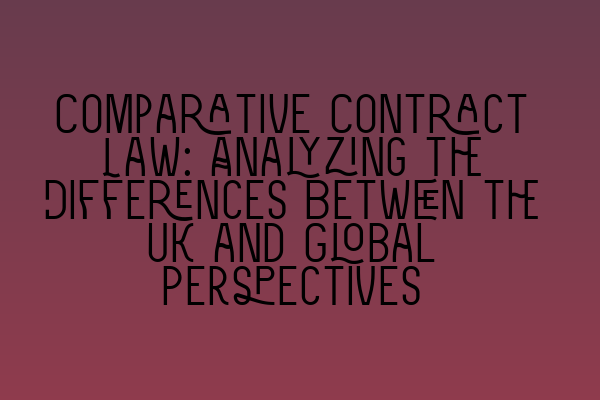Comparative Contract Law: Analyzing the Differences Between the UK and Global Perspectives
In today’s globalized world, businesses are expanding their operations across borders, resulting in an increased need for understanding and navigating the complexities of contract law in different jurisdictions. Comparative contract law plays a crucial role in this process as it helps businesses and legal professionals analyze and interpret the differences between various legal systems. This allows them to make informed decisions and effectively negotiate contracts while mitigating the associated risks.
The United Kingdom (UK) has a rich history of contract law, and its legal framework is highly regarded around the world. However, it is important to recognize that there are significant differences between the UK’s contract law and that of other jurisdictions. In this article, we will explore some of these differences, focusing on the UK and global perspectives.
One key difference lies in the sources of contract law. In the UK, contract law is primarily derived from common law, which is based on judicial decisions. This means that courts rely on precedent and case law to interpret and apply contract principles. On the other hand, many jurisdictions adopt a civil law system, where contract law is codified in statutes. This can result in differences in the interpretation and application of contract law principles between the UK and these jurisdictions.
Another important aspect to consider is the formation and enforceability of contracts. In the UK, a contract is formed when there is an offer, acceptance, consideration, intention to create legal relations, and certainty of terms. This is known as the “offer and acceptance” model, which is widely recognized and applied. However, in some jurisdictions, such as the United States, contracts can be formed through other means, such as the “doctrine of promissory estoppel.” This allows for more flexibility in contract formation.
Furthermore, the remedies available for breach of contract vary across jurisdictions. In the UK, the primary remedy for breach of contract is the award of damages, which aim to compensate the innocent party for the loss suffered. This is known as the “common law” approach. However, in some civil law jurisdictions, the focus may be more on specific performance, where the court orders the breaching party to perform their obligations as agreed. This difference in approach can significantly impact the outcome of contract disputes and the overall risk management strategy of businesses operating internationally.
In addition to the variances in contract law principles, it is also crucial to consider cultural and business differences when analyzing contracts from a global perspective. Cultural norms and practices can influence the interpretation and performance of contracts, leading to potential challenges and misunderstandings. It is therefore essential for businesses to engage in cross-cultural communication and develop an understanding of the cultural context in which contracts are being negotiated and executed.
To navigate through these complexities, businesses and legal professionals need to stay informed about the latest developments and trends in comparative contract law. They should consider enrolling in SQE contract law courses to enhance their knowledge and skills in this area. Preparing for the SQE 1 exam can be a great way to test oneself and gain a deeper understanding of contract law principles. Additionally, taking practice exams like the SQE 1 Practice Exam Questions and practicing with mock exams such as FLK1 and FLK2 can help in assessing and improving one’s understanding of contract law.
As the world becomes increasingly interconnected, understanding comparative contract law becomes crucial for both domestic and international businesses and legal professionals. By recognizing and analyzing the differences between the UK and global perspectives, businesses can effectively navigate the complexities of contract law and establish stronger and more secure relationships with their counterparts around the world.
To ensure you stay up-to-date with the latest issues and developments in the SQE contract law, it is advisable to consult the SRA SQE Exam Dates. This will help you plan your exam preparation and ensure you are well-prepared for the SQE 2 exam.
In conclusion, comparative contract law provides a framework for analyzing the differences between the UK and global perspectives. By understanding these differences, businesses and legal professionals can make informed decisions and effectively negotiate contracts across jurisdictions. It is imperative to stay updated and continuously expand knowledge in this ever-evolving field. Enrolling in SQE contract law courses and utilizing practice exams and mocks like the SQE 1 Practice Exam Questions, FLK1, and FLK2 can be valuable resources in enhancing one’s understanding and preparation for the SQE exams. So, invest in your professional growth and equip yourself with the necessary knowledge and skills to excel in the complex world of comparative contract law.
